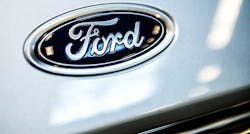Ford Cancels Plans to Import SUV Model from China in Wake of Tariffs
Ford Motor Co. is canceling plans to import a new crossover model from a plant in China after President Donald Trump’s tariffs undermined the business case for bringing the vehicle to the U.S. market.
Trump’s move to slap China-built autos with an additional 25% levy in July undermined the profitability of the Focus Active that Ford planned to start shipping into the U.S. about a year from now, Kumar Galhotra, president of North America, said in a conference call with reporters. The company decided it wasn’t worth investing more money in a vehicle that would have had fewer than 50,000 unit sales a year in the U.S.
“Our viewpoint on Focus Active was that, given the tariffs, obviously our costs would be substantially higher,” Galhotra said. “Our resources could be better deployed.”
Pulling the plug on the Focus Active won’t be hugely significant to Ford’s business in its home market, where it sells more than 2.5 million vehicles a year. But the decision does make the model another symbol of the side effects of Trump’s trade war for major manufacturers based both in the U.S. and abroad.
Daimler AG cut its profit outlook for this year in June, citing in part an expectation that Chinese customers would buy fewer Alabama-built sport utility vehicles as a result of Beijing’s retaliatory tariffs on U.S. auto imports. Harley-Davidson Inc. also has made plans to shift production of some motorcycles out of the U.S. to feed markets in the European Union, which put tariffs on its bikes as reprisal for Trump’s steel and aluminum levies.
War-Gaming
As Trump continues to wage trade battles on multiple fronts, automakers are anxiously war-gaming where they’ll assemble cars and procure parts for them. In addition to the levies already implemented for cars imported from China, the U.S. has also threatened steep tariffs on vehicles shipped from Europe and has a preliminary agreement with Mexico to require that more cars and components are made by higher-wage workers to avoid duties.
Ford’s financial state has been deteriorating as it’s over-relied on North American operations that have seen profit margins shrink due to an aging lineup. While the company has pledged to get back to a 10% margin, it hasn’t said by when.
Moody’s Investors Service this week downgraded the company’s credit rating to a step removed from junk, citing risks associated with a turnaround effort that Chief Executive Officer Jim Hackett has warned could be costly and take years. While analysts have warned the dividend that matters a great deal to Ford’s founding family may need to be cut, the company has said it’s not at risk. Last month, Ford’s stock dipped below $10 for the first time since 2012. The shares fell as much as 2.1% to $9.50 as of 12:06 p.m. Friday in New York.
Canceling the Focus Active is the latest move in Ford’s oft-evolving strategy for global passenger cars. The company had planned to move production of the Focus to Mexico, drawing rebukes from Trump in the lead-up to the 2016 election. Last year, Ford decided to shift production to China, and this year the automaker made the move to eventually stop selling almost all of its passenger cars in the U.S.
Galhotra said Ford builds about 80 percent of the cars it sells in the U.S. in its home market and another 15 percent are assembled in Canada and Mexico. The remainder of its deliveries are primarily comprised of two models imported from India and Spain: the EcoSport crossover and the Transit Connect van.
By David Welch
About the Author
Bloomberg
Licensed content from Bloomberg, copyright 2016.
